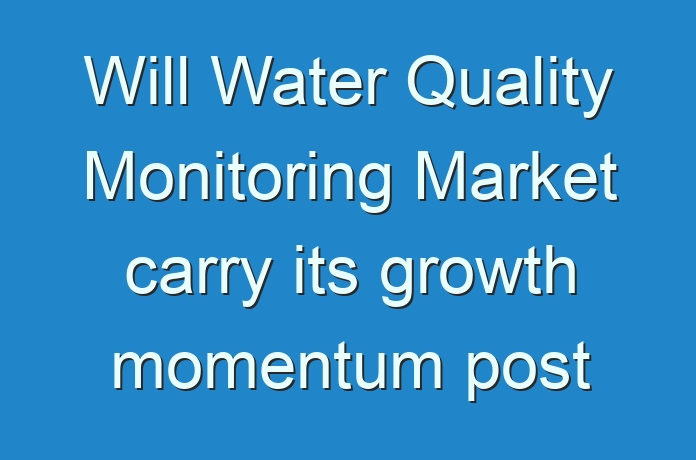
Water is the most important and basic natural resource. Water quality refers to physical, biological, radiological and chemical characteristics of water. It is a measure of water condition relative to any human need or purpose. Clean water is necessary to drink, operate factories, laboratories, grow crops for food etc. Water is thus important to every aspect of our lives. Large number of toxic chemicals are discharged in rivers everyday by virtue of human waste and industrial chemicals. Thus, monitoring water quality becomes the need of utmost importance. Monitoring the quality of water is going to help protect waterways from pollution. It helps in revealing the composition and health of rivers, lakes and streams in time. Without fresh water sustainable development will not be possible. Water quality monitoring is defined by International Standard for Organization as “the programmed process of measurement, sampling and subsequent signaling or recording or both of water characteristics with the aim of evaluating conformity to specified objectives”. Water quality can be determined only in terms of appropriateness for a purpose. For instance, water which is to be used for agricultural irrigation should contain low sodium content. Similarly drinking water should not contain micro-organisms or chemicals that could be hazardous to health. Water quality monitoring is the basis for water management. Monitoring enables the government to take rational decisions on describing and identifying emerging and actual problems of water pollution. It also helps in setting priorities and formulating plans for water quality management. Water quality monitoring provides the objective evidence to determine compliance with water standards. Based on monitored data water managers and law makers can determine if water quality is getting worse or better and measure effectiveness of water policies. End of the day, quality monitoring is an essential part of preserving the planet healthy and sustainable.
In recent years, industrial waste and toxic chemicals are increasingly discharged in rivers and other water resources that is calling for need for water quality monitoring. Also increasing government funding for pollution control and monitoring is driving the water quality monitoring market. The growing awareness of water quality measurement owing to rising level of water pollution is also driving the water quality monitoring market. However, high cost associated with water quality testing products and technical limitations related to water monitoring products are restraining the growth of water quality monitoring market. Moreover, lack of awareness about water quality among rural people in developing countries is also the restraining factor for the growth of the market. Advancement in technologies associated with water quality monitoring equipment and growing popularity of smart city concept is expected to create opportunities for the growth of water quality monitoring market. Additionally proliferation of IoT enabled devices for tracking and collecting data thereby enabling remote water quality monitoring is also creating opportunities for the growth of water quality monitoring market.
Planning to lay down future strategy? Perfect your plan with our report sample here https://www.transparencymarketresearch.com/sample/sample.php?flag=S&rep_id=30713

The global water quality monitoring market can be segmented on the basis of equipment type, application and region. In terms of equipment type, the water quality monitoring market can be segmented into TOC analyzers, pH meters, conductivity sensors, dissolved oxygen analyzers, turbidity meters and others. The water quality monitoring market is classified on the basis of application into groundwater, waste water, aquaculture, drinking water, coastal and laboratory. Geographically, the water quality monitoring market is segmented into North America, Asia-Pacific, Middle-East and Africa (MEA), South America and Europe.
Industry participants leading the water quality monitoring market with the significant developments are YSI Inc. /Xylem Inc., Emerson, Heron Instruments Inc., GE water and process technologies, In-Situ, Thermo Fisher Scientific, Hach, RS Hydro, ATI UK, LaMotte Company and Jenco, among others.
The report offers a comprehensive evaluation of the market. It does so via in-depth qualitative insights, historical data, and verifiable projections about market size. The projections featured in the report have been derived using proven research methodologies and assumptions. By doing so, the research report serves as a repository of analysis and information for every facet of the market, including but not limited to: Regional markets, technology, types, and applications.
The study is a source of reliable data on:
- Market segments and sub-segments
- Market trends and dynamics
- Supply and demand
- Market size
- Current trends/opportunities/challenges
- Competitive landscape
- Technological breakthroughs
- Value chain and stakeholder analysis
The regional analysis covers:
- North America (U.S. and Canada)
- Latin America (Mexico, Brazil, Peru, Chile, and others)
- Western Europe (Germany, U.K., France, Spain, Italy, Nordic countries, Belgium, Netherlands, and Luxembourg)
- Eastern Europe (Poland and Russia)
- Asia Pacific (China, India, Japan, ASEAN, Australia, and New Zealand)
- Middle East and Africa (GCC, Southern Africa, and North Africa)
Looking for exclusive market insights from business experts? Request a Custom Report here https://www.transparencymarketresearch.com/sample/sample.php?flag=CR&rep_id=30713
Contact Us
Transparency Market Research
State Tower,
90 State Street,
Suite 700,
Albany NY – 12207
United States
USA – Canada Toll Free: 866-552-3453
Email: sales@transparencymarketresearch.com
Website: https://www.transparencymarketresearch.com





